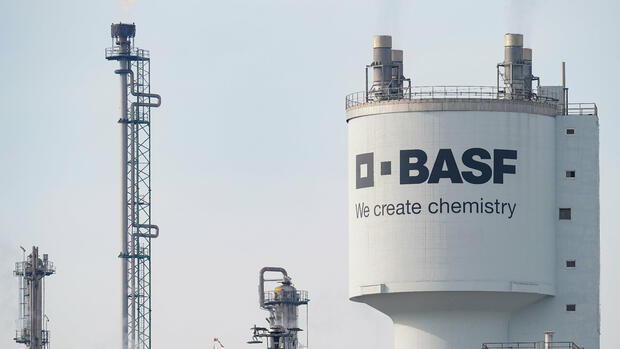Dusseldorf The chemical group BASF lowers its annual targets and only expects sales of a maximum of 76 billion euros for 2023 instead of 87 billion euros. The company does not assume that demand for its products will continue to fall in the second half of the year. However, one only expects a “tentative recovery”. “This means that margins will also remain under pressure,” says an ad hoc announcement published by BASF on Wednesday evening.
Analysts had already expected that the group would have to correct its outlook. In June, the specialty chemicals group Lanxess lowered its outlook for the year as a whole – profit expectations by as much as 30 percent. The Swiss chemical company Clariant followed, and only at the beginning of the week did the MDax group Evonik lower its targets. The chemical industry is regarded as an indicator of the state of the global economy. So the fact that chemical companies are currently cutting their forecasts on a large scale is a bad sign.
The chemical industry had originally expected demand to recover by the second half of the year at the latest. However, this recovery is now likely to be much weaker than expected, driven primarily by the Chinese market. The German Chemical Industry Association (VCI) also wants to correct its forecast from spring – the lack of orders in particular is having a negative impact on the industry.
“The profit warning from BASF was expected by the market, but it is quite severe,” says Markus Mayer, an analyst at Baader Bank. BASF only expects an EBIT of between 4.0 and 4.4 billion euros – the company had initially stated a range of between 4.8 and 5.4 billion. “Since BASF does not expect a quick recovery, the statements for 2024 are also very negative,” says Mayer.
>> Read here: A goal of more than 30 percent profit margin: BASF wants to become number one in battery materials worldwide
The preliminary results for the second quarter at BASF are also disappointing: According to them, sales fell by 25 percent and EBIT by 57 percent to just under one million euros. The profit even shrank by 76 percent to 499 million euros – in the same quarter last year it was still over two billion.
Location Germany no longer competitive?
The chemical industry is primarily suffering from reduced demand, lower prices and currency effects. At times, customers had built up high inventories, which depressed demand from chemical companies. At the same time, production is at a low level and sales in the industry have been falling for months. Although the demand for basic chemicals is not likely to fall any further, global demand for consumer goods is likely to be lower than previously assumed, according to BASF.
“It’s not just the high energy and production costs that are weighing on the chemical business,” said Ifo industry expert Anna Wolf at the beginning of July. “The order situation of many companies has also continued to deteriorate, because global demand for chemical products is still weak.” In the monthly economic survey by the Ifo Institute, the business climate in the chemical industry recently fell to minus 28.3 points – that was in May Barometer still at minus 12.5 points.
“The global economy is sluggish, and we’re feeling the effects too,” said Evonik CEO Christian Kullmann earlier this week when Evonik corrected its targets downwards. Over such a long period of time he had “perhaps never before” experienced such weak sales. Lanxess boss Matthias Zachert recently railed against the high energy prices: “In times of global demand weakness, Germany is simply not competitive.”
>> Read here: After hedge fund attack: Brenntag takes step towards possible split
But the bottom could be reached, says analyst Mayer. In some areas of the value chain, such as chemicals for furniture, textiles or paints, customers had already started to reduce their inventories in August last year. In the meantime, the stocks there are almost exhausted and in some cases are even at a “historic low”, as Mayer reports from talks with over 40 chemical companies.
Will things get better in China soon?
However, there are still markets, such as the construction industry or the automotive industry, where destocking only started later – and is therefore likely to last longer. “While it doesn’t look like things are going to get any better from the third quarter, there is an opportunity to start growing sequentially again,” Mayer says.
The current situation could also affect investments in the industry: According to the analyst, BASF, for example, could postpone or stretch some investments. But other major investments would continue. In China, for example, BASF is currently investing in a new composite plant: “We are in the middle of construction there. Pushing it now makes no sense,” says Mayer.
The analyst also sees opportunities for China: just this week there were indications that the People’s Republic could support the construction industry. “If that really happens and construction activities in China start again, that would be very important for BASF and the entire chemical industry,” says Mayer.
More: Drastic profit warning: Evonik does not expect any recovery in 2023
